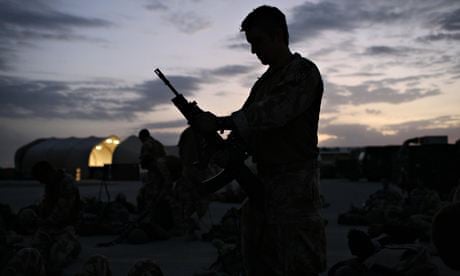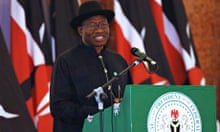The number of Afghanistan veterans seeking help for mental health problems surged in 2013 and is likely to peak again this year as the British military ends its 13-year conflict in the country, according to new figures published on Monday.
There was a 57%increase in the number of ex-military personnel needing treatment from the charity Combat Stress, which had a record 358 Afghanistan-related referrals last year, compared with 228 in 2012.
The number of Iraq veterans needing help also rose by nearly 20%, even though British troops ended combat operations in the country five years ago, and left altogether in 2011.
Commodore Andrew Cameron, chief executive of Combat Stress, added that he expected the numbers to further increase over the coming years and the UK had to prepare for the escalation. Most mental health issues take time to emerge, and armed forces veterans are often unwilling to admit they need help.
"These statistics show that, although the Iraq war ended in 2011 and troops are withdrawing from Afghanistan later this year, a significant number of veterans who serve in the armed forces continue to relive the horrors they experienced on the frontline or during their time in the armed forces," Cameron said. "Day in, day out, they battle these hidden psychological wounds, often tearing families apart in the process."
Even now, Combat Stress is taking on new cases from veterans who fought in conflicts from an earlier generation, such as the Malayan Emergency, which ended in 1960, and the 1982 Falklands war.
But the vast majority of its current caseload of 5,400 patients comprises veterans from Iraq, Afghanistan and Northern Ireland, with sharp rises in referrals from all three in recent years.
Cameron said that one-fifth of all veterans were likely to need help for some form of mental illness and that it could take more than a decade before symptoms presented themselves. "They have faced unique challenges and require, and deserve, specialist support to help them overcome these challenges. However, with demand for our services already rising, Combat Stress faces a real challenge. We are planning for services at or above the current level for at least the next five years, and we do not expect to see demand for support tail off in the near future," he said.
Combat Stress compiled the statistics to mark its 95th anniversary. It has worked with veterans of every conflict since the second world war, and has found that, on average, servicemen and women wait 13 years after leaving the military before seeking help. It has supported 20,326 veterans, including soldiers, sailors and air crews who fought in Aden, Korea and the Iran-Iraq war. More than 83% of those needing treatment have served in the army, and 3% of the total are women.
Military charities are bracing themselves for an increase in referrals now that the Afghanistan conflict is drawing to a close, with conditions ranging from depression to post-traumatic stress disorder.
Combat Stress said it had only one referral in the first year of the conflict in 2003 and two the year after. But with tens of thousands of troops having deployed to the country over the past decade, those numbers have increased sharply, particularly over the past three years.
It estimates that 42,000 UK troops who served in Iraq and Afghanistan may develop a mental health condition over the coming decades.
The charity has treated 1,300 Afghanistan veterans so far and has 662 in its care. It has received 1,968 cases involving Iraq veterans and is treating 806.
General Sir Richard Dannatt, chief of the general staff when British forces were fighting in Iraq and Afghanistan, said: "There is no doubt that combat, whether in Northern Ireland, the Falklands, the Gulf war 90-91, Bosnia, and elsewhere, has always produced psychiatric casualties, just as it produced 'shell shock' in the first world war.
"Our operations in Iraq and Afghanistan have, and will, produce a sharp upturn in such psychiatric casualties. How many, no one really knows.
"The Ministry of Defence will always try to talk the figure down for budgetary and compensation reasons. But psychiatric injuries should be widely recognised and talked about."
Dannatt said that former soldiers were often caught up in a "culture of coping alone" and that it needed to be recognised that there were too many former combatants who ended up in jail as murderers, or as suicide victims.
He argued that it was necessary to make mental health treatment more rapidly available: "If you break a leg, you don't wait six weeks for a fracture clinic appointment. The same must apply in the mental health area."
The MoD has launched several campaigns to challenge the stigma associated with mental health problems, including one called "Don't Bottle it Up". It has provided funding for Combat Stress – and more community psychiatric nurses are being hired to boost community outreach teams.
"We are committed to giving everyone who serves in our armed forces all the help and support they need," a government spokesman said, adding that £7.4m had been invested to improve mental health services available to former soldiers. It was the aim of the government "to further reduce the stigma of mental illness" and to encourage more veterans in need to come forward.
The Tory donor and peer Lord Ashcroft was commissioned by the prime minister, David Cameron, to write a review of services for armed forces veterans, which was published in February.
He said that greater awareness of the problems faced by veterans "may be contributing to the perception of a bow wave of PTSD cases".
He added: "There is a widespread public perception that veterans are likely to be physically, mentally or emotionally damaged by their time in the armed forces. This in itself constitutes an unnecessary extra hurdle for service leavers, restricting their opportunities by lowering expectations of what they can do."





Comments (…)
Sign in or create your Guardian account to join the discussion